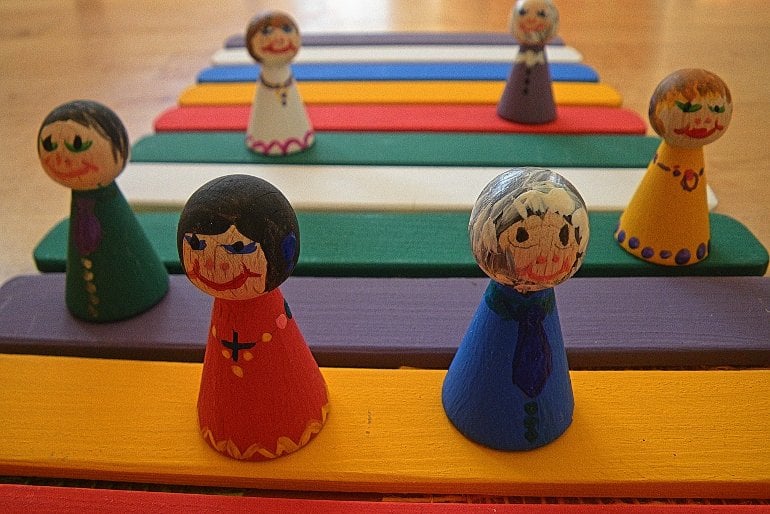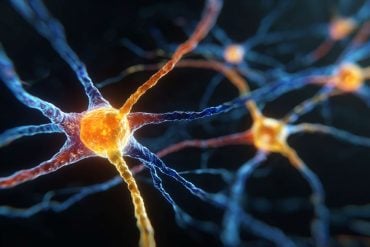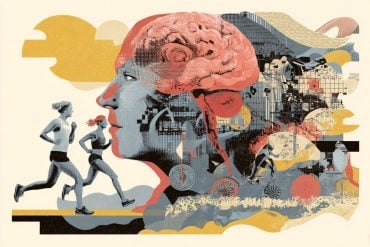Summary: A newly developed play therapy platform is helping older adults with dementia improve a range of flagging cognitive skills from concentration to memory.
Source: ETH Zurich
A dementia diagnosis turns the world upside down, not only for the person affected but also for their relatives, as brain function gradually declines. Those affected lose their ability to plan, remember things or behave appropriately. At the same time, their motor skills also deteriorate. Ultimately, dementia patients are no longer able to handle daily life alone and need comprehensive care. In Switzerland alone, more than 150,000 people share this fate, and each year a further 30,000 new cases are diagnosed.
To date, all attempts to find a drug to cure this disease have failed. Dementia, including Alzheimer’s – the most common of several forms of dementia – remains incurable. However, a clinical study carried out in Belgium with the involvement of ETH researcher Eling de Bruin has now shown for the first time that cognitive motor training improves both the cognitive and physical skills of significantly impaired dementia patients. A fitness game, known as “Exergame”, developed by the ETH spin-off Dividat was used in the study.
Better cognitive ability thanks to training
In 2015, a team of scientists led by ETH researcher Patrick Eggenberger showed that older people who train both body and mind simultaneously demonstrate better cognitive performance and can thereby also prevent cognitive impairment (as reported by ETH News). However, this study was carried out on healthy subjects only.
“It has been suspected for some time that physical and cognitive training also have a positive effect on dementia,” explains de Bruin, who worked with Eggenberger at the Institute of Human Movement Sciences and Sport at ETH Zurich. “However, in the past it has been difficult to motivate dementia patients to undertake physical activity over extended periods.”
ETH spin-off combines exercise and fun
With a view to changing this, Eva van het Reve, a former ETH doctoral student, founded the ETH spin-off Dividat in 2013 together with her PhD supervisor Eling de Bruin and another doctoral student. “We wanted to devise a customised training programme that would improve the lives of older people,” says van het Reve. Fun exercises were developed in order to encourage people who were already experiencing physical and cognitive impairments to participate in training, and the Senso training platform was born.
The platform consists of a screen with the game software and a floor panel with four fields that measure steps, weight displacement and balance. The users attempt to complete a sequence of movements with their feet as indicated on the screen, enabling them to train both physical movement and cognitive function simultaneously. The fact that the fitness game is also fun makes it easier to motivate the subjects to practice regularly.
Eight weeks’ training for dementia patients
An international team led by Nathalie Swinnen, a doctoral student at KU Leuven, and co-supervised by ETH researcher de Bruin, recruited 45 subjects for the study. The subjects were residents of two Belgian care homes, aged 85 years on average at the time of the study and all with severe dementia symptoms.
“The participants were divided into two groups on a random basis,” explains de Bruin. “The first group trained for 15 minutes with the Dividat Senso three times a week for eight weeks, while the second group listened to and watched music videos of their choice.” Following the eight-week training programme, the physical, cognitive and mental capacity of all subjects was measured in comparison with the start of the study.
Regular play has an effect
The results offer hope to dementia patients and their relatives: training with this machine indeed enhanced cognitive skills, such as attention, concentration, memory and orientation. “For the first time, there’s hope that through targeted play we will be able not only to delay but also weaken the symptoms of dementia,” emphasises de Bruin.

It is particularly striking that the control group deteriorated further over the eight-week period, while significant improvements were recorded in the training group. “These highly encouraging results are in line with the expectation that dementia patients are more likely to deteriorate without training,” adds de Bruin.
But playful training not only has a positive impact on cognitive ability – researchers were also able to measure positive effects on physical capability, such as reaction time. After just eight weeks, the subjects in the training group reacted significantly more quickly, while the control group deteriorated. This is encouraging in that the speed with which older people respond to impulses is critical in determining whether they can to avoid a fall.
A better understanding of brain processes
The research group led by de Bruin is currently working on replicating the results of this pilot study with people with mild cognitive impairment – a precursor of dementia. The aim is to use MRI scans to investigate more closely the neural processes in the brain responsible for the cognitive and physical improvement.
About this dementia research news
Source: ETH Zurich
Contact: Dr. Eling de Bruin – ETH Zurich
Image: The image is in the public domain
Original Research: Open access.
“The efficacy of exergaming in people with major neurocognitive disorder residing in long-term care facilities: a pilot randomized controlled trial” by Patrick Eggenberger et al. Alzheimer’s Research and Therapy
Abstract
The efficacy of exergaming in people with major neurocognitive disorder residing in long-term care facilities: a pilot randomized controlled trial
Background
It is currently unknown whether exergaming is efficacious in people with major neurocognitive disorder (MNCD) residing in long-term care facilities. This pilot randomized controlled trial (RCT) explored the efficacy of a stepping exergame program on gait speed, balance, mobility, reaction time, cognitive and neuropsychiatric outcomes, quality of life, and daily life functioning in people with MNCD residing in long-term care facilities.
Methods
Participants were randomly assigned to 8 weeks, three times weekly, 15 min of exergaming versus watching preferred music videos. The exergame device consisted of a pressure-sensitive step training platform on which participants performed stepping movements to play the games. The device automatically adapted the training level to the participants’ capabilities. The Short Physical Performance Battery (SPPB), step reaction time test (SRTT), Montréal Cognitive Assessment (MoCA), Neuropsychiatric Inventory (NPI), Cornell Scale for Depression in Dementia (CSDD), Dementia Quality of Life (DQoL), and Katz Activities of Daily Living (Katz ADL) were assessed at baseline and post-intervention. A Quade’s non-parametric ANCOVA controlling for baseline values with post hoc Bonferroni correction (p < 0.00625) was used to analyze pre- and post-differences between the groups. Partial eta-squared (η2p) effect sizes were calculated.
Results
Forty-five of 55 randomized inpatients with mild to moderate MNCD (Mini-Mental State Examination score = 17.2 ± 4.5; aged 70–91; 35 women) completed the study. The exergame group (n = 23) demonstrated improvements in gait speed (p < 0.001, η2p = 0.41), total SPPB (p < 0.001, η2p = 0.64), SRTT (p<0.001, η2p = 0.51), MoCA (p<0.001, η2p = 0.38), and reductions in CSDD (p<0.001, η2p = 0.43) compared to the control group (n = 22). There were no differences in NPI (p = 0.165, η2p = 0.05), DQoL (p = 0.012, η2p = 0.16), and ADL (p = 0.008, η2p = 0.16) post-intervention scores between the experimental and control group, albeit DQol and ADL measures showed large effect sizes in the exergame group. The mean attendance rate was 82.9% in the exergame group and 73.7% in the music control group. There were no study-related adverse events reported by the participants, nor observed by the research team.
Conclusions
The findings of this pilot RCT suggest that an individually adapted exergame training improves lower extremity functioning, cognitive functioning and step reaction time and symptoms of depression in inpatients with MNCD residing in long-term care facilities.
Trial registration
ClinicalTrials.gov, NCT04436302






